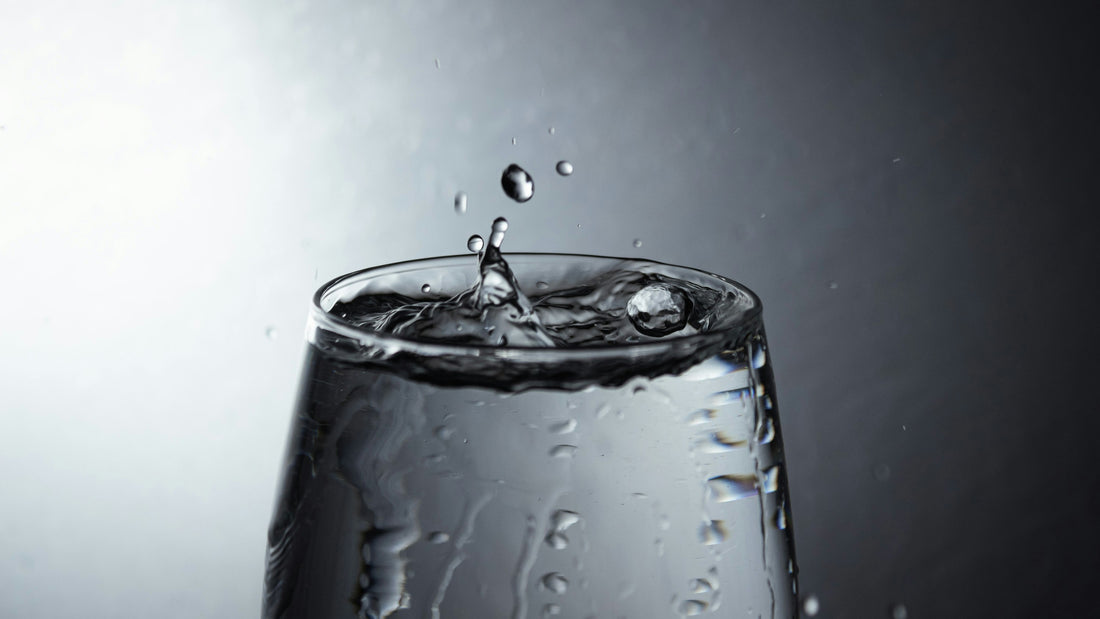
What Is Distilled Water? Everything You Need to Know Before You Drink It?
By Dan DeBaunShare
You’ve probably heard of the term “distilled water,” but how does it differ from ordinary water or filtered water? Is it safe to drink? What should you watch out for? We answer all these questions—and more!—in the article below.
Here’s what you will learn in this article:
- What is distilled water?
- How to make distilled water?
- Is distilled water good to drink?
- What happens if you drink distilled water long-term?
- What is distilled water used for?
- Can you use distilled water for baby formula?
- How does distilled water compare with other types of water?
- Does distilled water go bad?
What is Distilled Water?
Distilled water is water that has been purified through a process called distillation, which involves boiling the water, capturing the steam, and then condensing it back into a liquid in a clean container. This process removes 99.9% of impurities, including minerals, salts, heavy metals, and most types of bacteria and chemicals, leaving behind pure H₂O.
Because of this high level of purity, distilled water is often used in laboratories, medical settings, and certain manufacturing processes, as well as in household appliances like humidifiers and steam irons, where mineral buildup from tap water could cause damage. Some people also choose to drink distilled water, especially in areas where tap water may be questionable.
However, it’s important to note that distilled water contains no beneficial minerals, like calcium or magnesium, that are found in natural spring or mineral water, which is something to consider if it’s your primary source of hydration.
It’s important to note that the distillation process itself will not remove volatile organic compounds (VOCs) from the water. To remove VOCs, the water must pass through a carbon filter after it has been processed by the water distiller system.
In short, distilled water is water in its purest form, free from almost everything except the water molecules themselves.
How Is Distilled Water Made?
Distilled water is made using a process called distillation, which replicates the natural water cycle — where water evaporates, cools and condenses in clouds, before falling to the ground as rain — but in a controlled, man-made environment using a water distiller.
Here's how it works, step by step:
- Boiling: Water is heated until it reaches its boiling point and turns into steam. This separates the water from dissolved solids, minerals, salts, and most contaminants, which are left behind in the boiling chamber.
- Capturing the steam: The steam rises and travels through a cooling system, typically a coil or condenser.
- Condensing: As the steam cools, it turns back into liquid water. This pure water, which is now free from most impurities, is collected in a separate container.
- Storage: The resulting distilled water is stored in a clean, often sterile, container to prevent recontamination.
A water distiller typically consists of two chambers: an evaporation chamber and a chamber to collect the steam condensate, typically collected in a glass container. Some home distillers follow the process outlined above using compact countertop distillers, while large-scale operations use industrial distillers to produce high volumes for hospitals, laboratories, and manufacturing.
The key takeaway? Distillation removes nearly all contaminants, making it one of the most thorough water purification methods available.
Is Distilled Water Safe to Drink?
While distilled water may be free of many pollutants, the jury is still out as to whether it is, in fact, safe to drink. The short answer is that distilled water is considered safe to drink, as it’s water in its purest form with no potentially harmful disinfectants or other chemicals added during the process.
However, one needs to look at the bigger picture to determine whether it would be wise to do so. The reason why it may not be a healthy choice, especially over the long term, is that the distillation process is so efficient at removing stuff from water that pretty much everything is removed… Including beneficial minerals such as sodium, calcium, and magnesium that are essential for our health.
What Happens If You Drink Distilled Water Long-Term?
Drinking distilled water once in a while won’t do you any harm, but what if it’s your main source of drinking water for months or years?
Distilled water is free of impurities, but it’s also free of beneficial minerals like calcium, magnesium, and potassium. Over time, relying solely on distilled water could have subtle effects on your body, especially if your diet doesn’t make up for those missing minerals.
Here’s what to consider if you drink distilled water long-term:
- You may lack essential minerals: Distilled water contains no minerals, so you’ll need to get them from food or supplements to maintain proper hydration and nutrient balance.
- Possible changes in taste and hydration: Some people find distilled water tastes flat or bland. Without minerals, it may not quench your thirst as effectively as mineral-rich water would.
- Electrolyte imbalance: If you’re sweating heavily or exercising a lot, distilled water won’t help replenish lost electrolytes, which could lead to cramps or fatigue.
- No exposure to contaminants: One of the pros of drinking distilled water is that you’re avoiding chlorine, heavy metals, and bacteria that might be present in untreated tap water, which is a good thing.
- Not dangerous, but not ideal for everyone: While it's not harmful for most healthy people, long-term exclusive use of distilled water isn't usually recommended unless medically necessary.
In summary, distilled water is ultra-clean, but not necessarily ideal as your only source of hydration unless you’re balancing it with a mineral-rich diet.
When Should You Use Distilled Water?
While distilled water isn’t something most of us would drink every day, there are specific situations where its ultra-pure nature is beneficial. Because it's free from minerals, chemicals, and impurities, distilled water is the best choice in a variety of sensitive or technical scenarios, including:
- Medical equipment: Devices like CPAP machines, humidifiers, and nebulizers require distilled water to prevent mineral buildup that can damage equipment or reduce performance.
- Laboratory and scientific use: In labs or research settings, even trace contaminants can skew results. Distilled water ensures accuracy in testing and experimentation.
- Household appliances: Using distilled water in steam irons, humidifiers, and diffusers keeps them running smoothly by preventing scaling and residue buildup.
- Automotive batteries and cooling systems: Tap water can introduce minerals that degrade performance over time. Distilled water helps extend the life of your car’s components.
- Canning and preserving food: When canning fruits and vegetables, distilled water helps ensure purity and prevents cloudiness in your jars, and avoids unwanted chemical reactions.
- Baby formula: Especially in areas with questionable tap water quality, distilled water provides a clean, safe base for mixing formula for infants. More details in the section below.
In cases where precision, equipment longevity, cleanliness, or safety is a priority, distilled water is a smart and dependable choice.
Can Distilled Water be Used for Baby Formula?
Yes, distilled water can be safely used to prepare baby formula, and it’s often a smart choice for parents who want the safest option for their little one. Because distilled water has been purified to remove all impurities, it offers a clean and consistent option that reduces the risk of your baby being exposed to harmful contaminants.
This can be especially important for infants under 6 months old or in areas where tap water may not be reliably safe. For newborns with developing immune systems, this level of purity can help minimize the risk of exposure to potentially harmful substances like lead, nitrates, or pathogenic bacteria.
That said, always check with your pediatrician or follow your formula manufacturer’s guidance, as some recommend mineral-containing water for added nutrients. When in doubt, distilled water offers peace of mind when purity matters most, and your baby’s health certainly qualifies as a top priority.
How Does Distilled Water Compare with Other Types of Water?
When it comes to choosing the right type of water for your home, baby formula, appliances, or drinking needs, it helps to understand the differences between distilled water and other popular types. Each type comes with its advantages and disadvantages that may make it a good choice for certain applications but unsuitable for others.
Here’s a closer look at how distilled water stacks up against the rest:
Distilled Water vs Filtered Water
Water filtration systems with activated carbon filters can remove a broader range of contaminants—like VOCs—than distillation can. Like distillation, activated carbon filters are able to remove a wide range of harmful chemicals, including chlorine and its byproducts, as well as pollutants that can give drinking water a foul taste or cause it to smell bad.
Berkey water filtration systems fitted with Black Berkey filter elements can remove over 200 common drinking water contaminants, including pathogenic bacteria, viruses, cysts, and heavy metals such as arsenic and lead. They also retain beneficial minerals essential for health and improve the taste of water.
For an in-depth comparison, check out our full guide on Distilled Water vs. Filtered Water.
Distilled Water vs Spring Water
Spring water is sourced from natural springs and is often touted as "natural" because it contains minerals picked up as it flows through rocks. It's usually filtered and tested for safety, but may still contain trace contaminants. While it’s not as pure as distilled water, many people enjoy the taste due to its mineral content. However, it’s important to bear in mind that this can include harmful minerals such as arsenic, which occurs naturally in rocks and is highly toxic.
Distilled Water vs Purified Water
Purified water is any water that has gone through a purification process to remove chemicals and impurities. Distilled water is technically a type of purified water, but not all purified water is distilled. Reverse osmosis (RO) is a common method for creating purified water. During the RO process, water is forced through a semi-permeable membrane that traps impurities, including minerals, while allowing water molecules to pass through the tiny pores.
Distilled Water vs Tap Water
Distilled water is water in its purest form and contains no minerals or other contaminants, making it safe to drink over the short-term. Tap water straight from the faucet is treated by municipal water systems and needs to meet drinking water regulatory standards to ensure it is safe to drink. While it generally contains beneficial minerals, it can also contain trace levels of chlorine, fluoride, lead, or other potentially harmful contaminants, depending on local water quality and the state of the pipes bringing the water from the utility to your home. It's convenient and cheap, but not always the best choice for sensitive uses like baby formula or medical devices, and may not be the healthiest option over the long term.
Distilled Water vs Mineral Water
The key difference between distilled water and mineral water is that distilled water contains no minerals, while mineral water, as the name implies, contains minerals. Like spring water, mineral water has naturally occurring minerals like calcium, magnesium, and potassium. However, unlike spring water, it needs to contain a consistent level of minerals, which are often added to ensure consistency and improve taste. It’s a popular choice for drinking, but not suitable for appliances or uses requiring mineral-free water.
Water Type Comparison Table
| Type | Purity | Mineral Content | Safe for Daily Use | Taste |
| Distilled | Very High | None | Yes (short-term or with proper diet) | Flat/bland |
| Filtered | High | Some retained | Yes | Clean, fresh |
| Spring | Moderate | Natural minerals | Yes (if tested) | Crisp, earthy |
| Purified | High | Low to none | Yes | Neutral |
| Tap | Varies | Varies | Generally, yes | Chlorinated |
| Mineral | Moderate | High | Yes | Rich, mineral |
Whether you're after the cleanest water possible or a tasty mineral-rich sip, understanding the differences between different types of water can help you choose what’s best for your body, your home, and your lifestyle.
Can You Make Distilled Water at Home?
Yes, you absolutely can make distilled water at home, and it’s easier than you might think! Distillation is simply the process of boiling water into steam and then collecting the vapor as it condenses back into liquid, leaving impurities behind.
While you can buy a home water distiller for the sake of convenience, a basic DIY setup using a pot, a heat-safe bowl, and a lid will do the trick for a lot less money. It’s not the fastest method of producing purified water, but if you're looking for a way to create pure water for appliances, plants, or even emergency use, it’s a fun and useful skill to learn.
However, due to the slow-paced process, homemade distilled water may not be practical for large volumes, but for small batches, it's doable.
Still, if you're simply looking for healthy, contaminant-free water, filtration might be the way to go. Check out our blog post comparing distilled water and water filtered with Berkey systems to learn more!
Does Distilled Water Go Bad?
While distilled water doesn’t spoil in the traditional sense—like milk or juice—that doesn’t mean it will last forever. Because it's free of minerals, bacteria, and other impurities, distilled water has an impressively long shelf life and can remain safe to use for a very long time, even years. However, its longevity depends heavily on how it's stored.
If kept in a sealed, sterile container and out of direct sunlight, distilled water can last indefinitely for uses like in appliances, medical devices, or car batteries. But once opened, the water is exposed to air, and potentially to bacteria and other contaminants. Over time, it can absorb carbon dioxide from the air, which slightly lowers its pH and could affect taste or usability in sensitive equipment.
While distilled water doesn’t have a strict expiration date, if you’re using it for drinking purposes or to mix baby formula, it's best to use opened distilled water within a few weeks and always store it in a clean, food-grade container with a tight-fitting lid.
If the water looks cloudy, has particles, or smells off, it’s better to err on the side of caution and replace it.
Want to Learn More?
Understanding what distilled water is and how it compares to other types of water can help you make smarter choices for your health, home, and your family. Whether you're using it for baby formula, household appliances, or you’re simply curious about what goes into your drinking water, knowledge is power.
If you found this article helpful, we encourage you to browse the rest of our blog for even more practical guides and answers to the questions you didn’t even know you had about the water you use every day.
Clean, safe, great-tasting water starts with being informed—and we’re here to help every step of the way.
FAQ
What is distilled water, and how is it made?
Distilled water is ultra-purified water made by boiling water into steam, then condensing that steam back into liquid, leaving behind minerals, bacteria, and other contaminants.
Is distilled water safe to drink daily?
Yes, it’s safe, but because it lacks essential minerals like calcium and magnesium, it’s not ideal as your only source of hydration long-term unless balanced with a nutrient-rich diet.
What’s the difference between distilled and purified water?
Distilled water is one type of purified water, made through boiling and condensation. Purified water may also be produced through other methods, like reverse osmosis or carbon filtration.
Can I use distilled water for baby formula?
Yes! Distilled water is a great choice for baby formula, especially in areas with questionable tap water. Just follow your pediatrician's or formula manufacturer’s advice.
Is boiled water the same as distilled water?
No. Boiled water may kill bacteria, but it still contains minerals and impurities. Distillation removes nearly everything except VOCs, making distilled water much purer.
How does distilled water compare to spring water?
Distilled water is free of all minerals and contaminants, while spring water contains natural minerals picked up from underground sources. Spring water usually tastes better but isn’t as pure.
-
Regular price From $302.00 USDRegular priceUnit price / per
-
Regular price $234.00 USDRegular priceUnit price / per
-
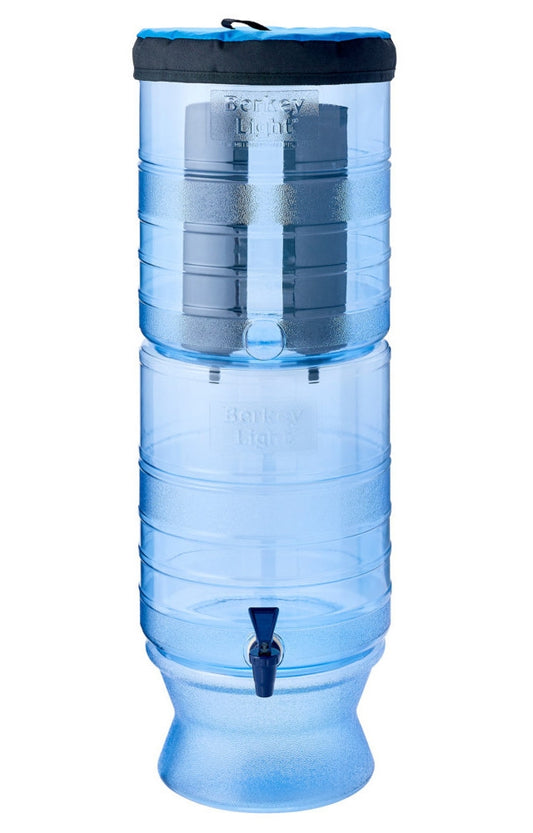
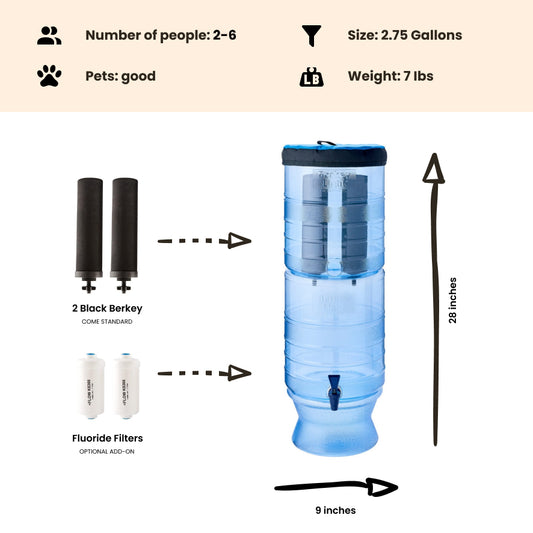 Sold outRegular price From $305.00 USDRegular priceUnit price / per
Sold outRegular price From $305.00 USDRegular priceUnit price / per -
Regular price $327.00 USDRegular priceUnit price / per
-

 Sold outRegular price From $367.00 USDRegular priceUnit price / per
Sold outRegular price From $367.00 USDRegular priceUnit price / per -
Regular price From $408.00 USDRegular priceUnit price / per
-
Regular price From $451.00 USDRegular priceUnit price / per

Dan DeBaun
Dan DeBaun is the owner and operator of Big Berkey Water Filters. Prior to Berkey, Dan was an asset manager for a major telecommunications company. He graduated from Rutgers with an undergraduate degree in industrial engineering, followed by an MBA in finance from Rutgers as well. Dan enjoys biohacking, exercising, meditation, beach life, and spending time with family and friends.
~ The Owner of Big Berkey Water Filters

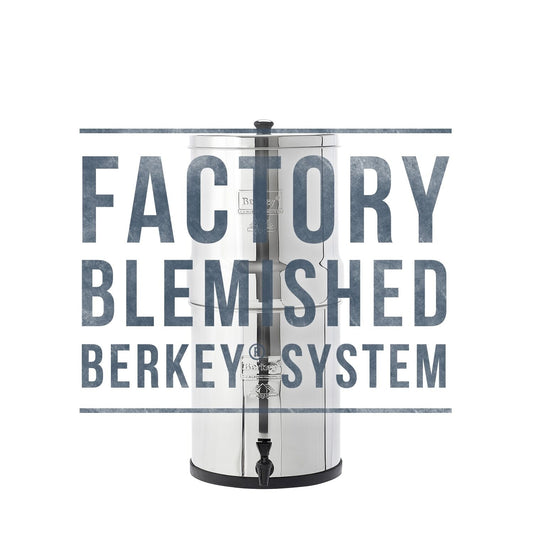
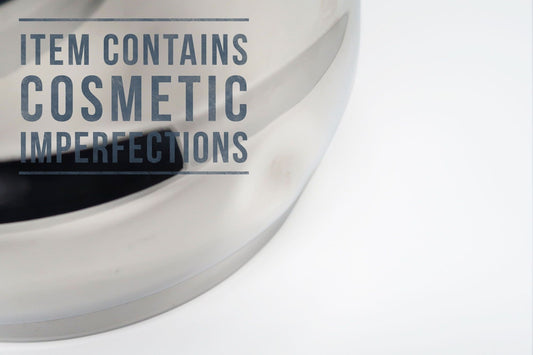








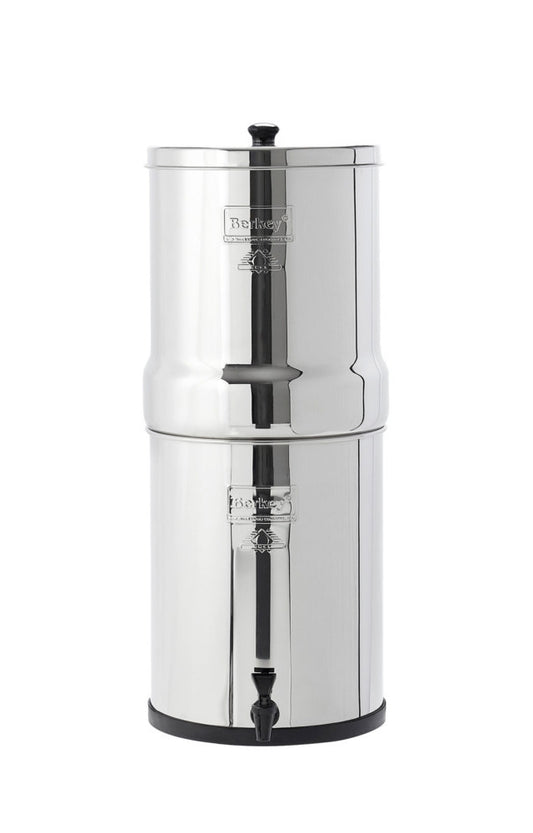
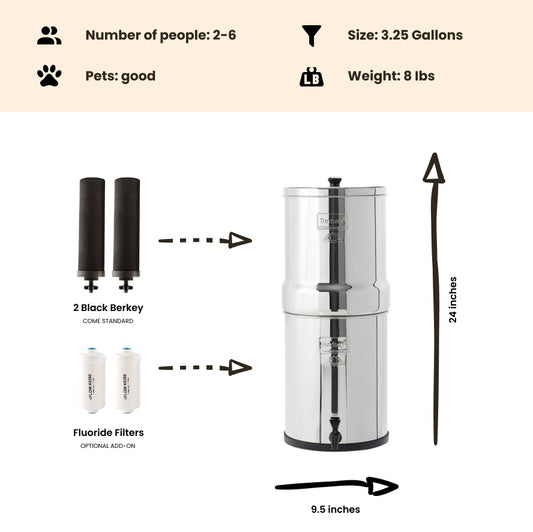



We couldn’t be happier with our Berkey filter. Is it okay to use it in humidifiers that take distilled water?
Interesantes puntos de vista, pero podríamos pensar en que los minerales inorgánicos del agua con minerales tiene un grado de responsabilidad en el desarrollo de Aterosclerosis por el Calcio inorgánico del agua mineral. El agua destilada en mi opinión es infinitamente mejor. Buen post, saludos.
Is this statement false “ Consuming distilled water is okay because the human body is unable to absorb minerals dissolved in water into body tissue anyhow.” It sounds kind of contradictory.
Hi Franck -
Correct, and this is an argument we've seen made on the internet.
Thanks
Dan
Can distilled water be harmful to a baby if it was mistaken for baby water
Hi Marianne -
Unfortunately, we do not know the answer to this question.
Thanks
Dan
How often do you run sales?
Hi Diana -
Yes, we do around special holidays, however if you sign up for our newsletter, you will receive the same level of discounts without having to wait for a sale to come along.
Thanks
Dan
My doctor just told me drinking distilled water is bad for my hair. I have alopecia. Is this true?
Hi Shana -
We are not familiar with that, so do not feel comfortable providing advice regarding this question.
Thanks
Dan
Look up Doctor Helen Parcells
Removing minerals from water makes no sense to me. Minerals are critical for the body, and most people are deficient as it is. It's well understood that we do not get the same amount of minerals in our food as we did 20, 50, 100 years ago due to over-farming. If anything, we should all be adding minerals to our water in the form of electrolytes on a daily basis.
Think about all the chemicals and pollutants that doesn’t get taken out and you get nutrients from your food
I don't need the fluoride filters if I don't have fluoride in my water right?
Hi John -
No, you would not need them.
Thanks
Dan
I bought a Berkey and I switch back and forth from drinking distilled water during my fasts, and then the Berkey for everyday drinking.
An environmental and food allergy specialist M.D. recommended 20+ yrs ago that I drink reverse osmosis or distilled water. I hate the taste of RO water, and the process wastes abt the same amt that it produces. My first distiller was still working when I decided to invest in an all stainless steel and glass machine about 6 months ago. Took a few days to adjust to the slightly metallic taste.
"Burning/Dry Mouth Syndrome" that increased over the past few years has me drinking mostly water. When I have at least 3L a day, my lips don't dry out. The cost of buying that much water, spring or otherwise, is out of the question, along with the challenge of lugging gallon jugs home. I also have a Berkey, the smaller, non-BPH plastic model, but I've never had the energy to assemble and prime the thing.
So I'll stick with the distiller. It was very expensive but if it lasts 20 yrs, the purchase price averages out to less than $30/year. I occasionally buy bottled spring and mineral water, but I love the convenience and ease of distilling my own. I know plenty of ppl find distilled water tasteless, but that's what I like the most about it.
Look into adding a mineralizer following distillation. The dry mouth and lips is due to filtering out beneficial minerals from your water. I had the same problem with my first RO unit. Once I replaced it with a unit with a remineralizer the problem ceased and the water was much more thirst quenching. Best of luck.
I'm not sure why anyone would think it's a good idea to drink distilled water on a daily basis.
I’m chronically dehydrated. I eat plenty of food with nutrients and electrolytes. I can tolerate drinking distilled water only. So drinking distilled makes sense for me. It would carry my electrolytes to muscles to decrease cramps.